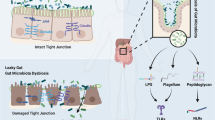Abstract
Given the prevalence of cardiovascular diseases (CVDs), as one of the most important non-communicable diseases (NCDs), the recognition of diagnostic biomarkers and potential treatment methods is very crucial. Today gut microbiota composition and its derived metabolites modification are known as one of the recent therapeutic strategies. Studies show that Trimethylamine N-oxide (TMAO) is a gut microbiota-derived metabolite that may be involved in the development of cardiovascular diseases, including ischemic disease and atherosclerosis, atrial fibrillation and arrhythmia, and heart failure. Due to existing some disagreements in this manner, future studies are needed to obtain a definitive sight of the association between this metabolite and CVDs. TMAO may be beneficial as a prognostic marker, which represents the degree of gut microbiota dysbiosis and subsequently CVD events and also different therapies methods based on TMAO and its metabolic pathways can be the target of clinical trial on cardiovascular disease and/or its prevention.
Similar content being viewed by others
Data availability
Not applicable.
References
Heianza Y, Ma W, Manson JE, Rexrode KM, Qi L. Gut microbiota metabolites and risk of major adverse cardiovascular disease events and death: a systematic review and meta-analysis of prospective studies. J Am Heart Assoc. 2017;6(7):e004947.
Ejtahed HS, Angoorani P, Soroush AR, Hasani-Ranjbar S, Siadat SD, Larijani B. Gut microbiota-derived metabolites in obesity: a systematic review. Biosci Microbiota Food Health. 2020;39(3):65–76.
Janeiro MH, Ramírez MJ, Milagro FI, Martínez JA, Solas M. Implication of trimethylamine N-oxide (TMAO) in disease: potential biomarker or new therapeutic target. Nutrients. 2018;10(10):1398.
Zhang Y, Wang Y, Ke B, Du J. TMAO: how gut microbiota contributes to heart failure. Translational Research: The Journal of Laboratory and Clinical Medicine. 2021;228:109–25.
Guasti L, Galliazzo S, Molaro M, Visconti E, Pennella B, Gaudio GV, et al. TMAO as a biomarker of cardiovascular events: a systematic review and meta-analysis. Intern Emerg Med. 2021;16(1):201–7.
Qi J, You T, Li J, Pan T, Xiang L, Han Y, et al. Circulating trimethylamine N-oxide and the risk of cardiovascular diseases: a systematic review and meta-analysis of 11 prospective cohort studies. J Cell Mol Med. 2018;22(1):185–94.
Svingen GF, Zuo H, Ueland PM, Seifert R, Løland KH, Pedersen ER, et al. Increased plasma trimethylamine-N-oxide is associated with incident atrial fibrillation. Int J Cardiol. 2018;267:100–6.
Ufnal M, Zadlo A, Ostaszewski R. TMAO: A small molecule of great expectations. Nutrition. 2015;31(11–12):1317–23.
Yang S, Li X, Yang F, Zhao R, Pan X, Liang J, et al. Gut microbiota-dependent marker TMAO in promoting cardiovascular disease: inflammation mechanism, clinical prognostic, and potential as a therapeutic target. Front Pharmacol. 2019;10:1360.
Meyer KA, Benton TZ, Bennett BJ, Jacobs DR Jr, Lloyd-Jones DM, Gross MD, et al. Microbiota-dependent metabolite trimethylamine N-oxide and coronary artery calcium in the coronary artery risk development in young adults study (CARDIA). J Am Heart Assoc. 2016;5(10):e003970.
Skagen K, Trøseid M, Ueland T, Holm S, Abbas A, Gregersen I, et al. The Carnitine-butyrobetaine-trimethylamine-N-oxide pathway and its association with cardiovascular mortality in patients with carotid atherosclerosis. Atherosclerosis. 2016;247:64–9.
Askarpour M, Hadi A, Bozorg ADK, Sadeghi O, Sheikhi A, Kazemi M, et al. Effects of L-carnitine supplementation on blood pressure: a systematic review and meta-analysis of randomized controlled trials. J Hum Hypertens. 2019;33(10):725–34.
Wang Z-Y, Liu Y-Y, Liu G-H, Lu H-B, Mao C-Y. l-Carnitine and heart disease. Life Sci. 2018;194:88–97.
Brown JM, Hazen SL. Meta-organismal nutrient metabolism as a basis of cardiovascular disease. Curr Opin Lipidol. 2014;25(1):48.
Hasani-Ranjbar S, Larijani B. Human microbiome as an approach to personalized medicine. Altern Ther Health Med. 2017;23(6):8–9.
Leshem A, Horesh N, Elinav E. Fecal microbial transplantation and its potential application in cardiometabolic syndrome. Front Immunol. 2019;10:1341.
Author information
Authors and Affiliations
Contributions
ZHT drafted the manuscript. SHR designed the study and helped to draft the manuscript. Both authors read and approved the final manuscript.
Corresponding author
Ethics declarations
Consent for publication
Not applicable.
Ethics approval and consent to participate
Not applicable.
Conflict of interests
The authors declare that they have no conflict interests.
Additional information
Publisher's note
Springer Nature remains neutral with regard to jurisdictional claims in published maps and institutional affiliations.
Rights and permissions
About this article
Cite this article
Hoseini-Tavassol, Z., Hasani-Ranjbar, S. Targeting TMAO and its metabolic pathway for cardiovascular diseases treatment. J Diabetes Metab Disord 20, 1095–1097 (2021). https://doi.org/10.1007/s40200-021-00819-x
Received:
Accepted:
Published:
Issue Date:
DOI: https://doi.org/10.1007/s40200-021-00819-x




